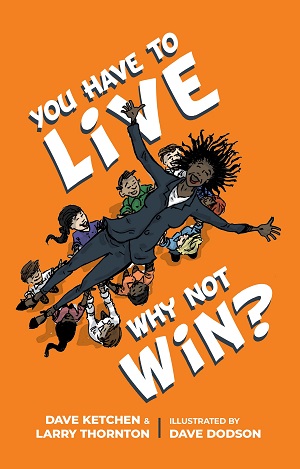“I like flying first class, granddad!” a young boy quips to his grandfather in the first panels of a graphic novel. “Enjoy it,” the grandfather says, “We’ll be landing soon.” Later, after discourse with a woman sitting across from them, the boy then asks the following question. “Why are you always talking to strangers?” The grandfather responds, “It’s all about relating to others…People skills are key to creating positive perceptions in many jobs, including mine.”
RELATED URL: https://www.whynotwin.org/product/you-have-to-live-why-not-win/
In telling a fully realized story, rather than just publishing a Bonafide business and leadership advice book, authors and illustrators Dave Ketchen, Larry Thornton, and Dave Dodson manage to succeed in what they have set out to do with a work like You Have to Live, Why Not Win? There’s a sense of distinctive, lived experience in each of the scenarios – and out-and-out analogous lessons Thornton, Ketchen, and Dodson are able to impart in a fun, entertaining, and immersive sense to the reader.
The illustrations add to the immersive nature of the book, adding a sort of eclectic and off-beat sensibility. This seems to compliment the personal and professional convictions of Thornton himself. “There’s no substitution for hard work,” Mr. Thornton is quoted as having said, in an article for the Atlanta Black Star. He also has been quoted to have said to mentees, “What is it that you see when you see me…And what is it that I see when I see you?”
AMAZON: https://www.amazon.com/Why-Not-Win-Reflections-fifty-year-ebook/dp/B07PMTC5HM/
Often leadership and business advice books, even when embracing the narrative, creative nonfiction format, fall into certain, distinctive traps. There can almost be a sense of things being removed, coming across as preachy and high-handed. Even people who have gone through great pains to reach the echelons and tiers of success depicted can fall to these sets of traits. But Thornton, Ketchen, and Dodson have both too much style, and too much genuine wisdom and humility, to let this happen. In a summarization of the book’s core lessons and themes, the trio states: “Three pervasive themes emerge from Larry’s journey.
First, people are the biggest key to winning in life. Your success depends on others and their success depends on you. As a result, the energy you invest in relationships pays tremendous dividends. Second, perception shapes how you think and act. Do you see a winner when you look in a mirror? If so, this confidence will help you win in life. If you don’t see a winner looking back at you, it is time to change your perception. Third, perseverance is required to endure life’s inevitable obstacles and challenges. Larry likes to say, ‘If you can’t take anything, you can’t have anything.’ Always taking the easy path and crumbling under adversity is not a recipe for winning. But if you can absorb life’s blows with a determined smile, you are on your way to winning in life.”
It’s this kind of rare articulation that makes the book not just have a good sense of inducing motivation, but universality whilst centering Mr. Thornton’s singular experience primarily.
Cyrus Rhodes



























